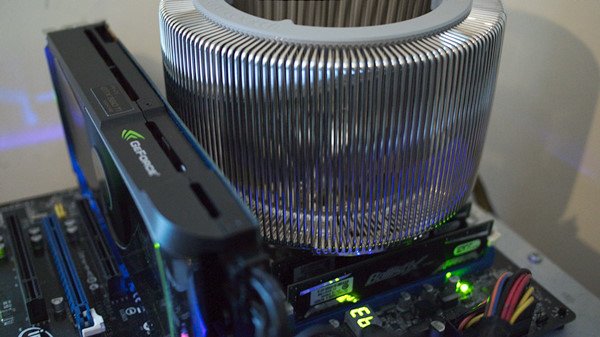Passive cooling for Core i7s

Bit of Friday fun for you – I'm testing a group of heatsinks for the next issue of the mag and was persuaded to try this out by the chaps at QuietPC.com. It's the Nofan CR-95C , a completely passive cooler that claims to be able to chill a 95W quad core Core i7 processor.
Naturally, I was a little bit skeptical.
Even though the latest generation of CPUs run almost impossibly cool for their processing power output, and the Intel stock cooler that ships with a Sandy Bridge Core i7 is the smallest I've seen since we had Pentium 3s in the lab, the idea of using a fanless heatsink seems utterly bonkers. There's no way you can possibly remove enough heat without using a fan, surely?
Apparently so. In the tests I've been running, the CR-95C actually beat the stock cooler on the testbed rig shown above. That's without the assistance of a single case fan to help disperse heat. In terms of temperatures, I used Prime95 to load all four hyperthreaded cores up to their maximum ability, and the heat peaked at 77 degrees – around five degress less than using the Intel cooler.
Cooling the chip back down after use took longer, of course, but within five minutes of idling it was back to under 30 degrees Celsius. And the best thing is that in a proper case, with well designed airflows and case fans, it should work even better.
You'll need a big case mind. The CR-95C really is enormous.
The thing is, even though I've seen it working, I think I'd still be skeptical of installing it my gaming rig. It might be illogical to worry about the 'what if it falls over after eight hours' scenario, but I can't get rid of that niggling doubt, and feel like I need the reassurance of fans if things start to get out of control. So I'm going to test it further over the weekend to be sure.
Keep up to date with the most important stories and the best deals, as picked by the PC Gamer team.
The other downside is that at £100 it's a lot of money to shave off a few decibels – with cheap air coolers being so efficient and quiet any way, you'll need an almost slient room and very quiet power supply to actually hear the difference.
Still, it's a remarkable achievement all the same.

